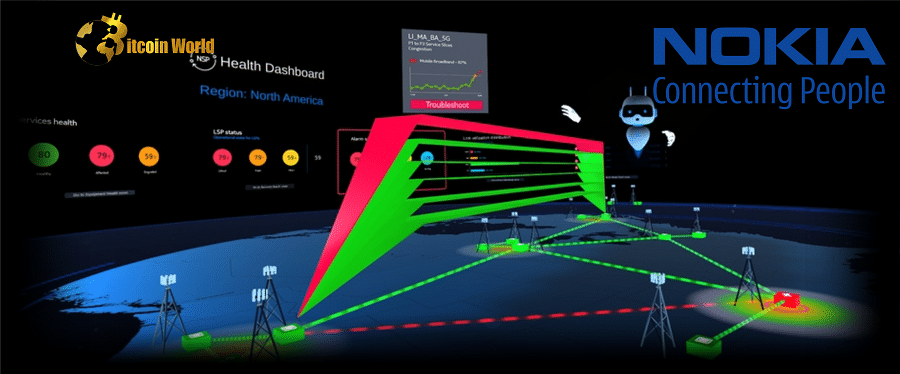Nokia, a name synonymous with the sturdy mobile phones of yesteryear, is charting a fascinating new course. Forget consumer gadgets for a moment – the Finnish tech giant is diving headfirst into the industrial metaverse. Yes, you read that right. While many envision the metaverse as purely for gaming and social interaction, Nokia sees a much larger, more immediate opportunity: transforming industries from the ground up.
Nokia: From Phones to the Metaverse – A Strategic Evolution
For years, Nokia has been the backbone of telecommunications infrastructure, quietly powering the internet behind the scenes. Now, they’re leveraging this expertise to build the very fabric of the industrial metaverse. But what exactly does this mean? It’s about using metaverse technologies – augmented reality (AR), virtual reality (VR), digital twins, and more – to solve real-world problems in industries. Think about it: connecting experts remotely, optimizing complex processes, and enhancing worker training, all within immersive digital environments.
Robert Joyce, Nokia Oceania’s CTO, puts it simply: Nokia is in the business of “delivering the internet,” and the metaverse is a significant part of that ambition. To back this up, Nokia isn’t just talking the talk. They’ve established dedicated labs to explore metaverse technologies and are actively collaborating with universities and businesses to bring these concepts to life.
Brewing Beer in the Metaverse? Nokia’s Innovative Use Cases
Sounds futuristic, right? It’s already happening. Nokia is demonstrating the power of the industrial metaverse through some compelling real-world examples:
- The Metaverse Microbrewery: Imagine brewing beer collaboratively with experts across continents, all without leaving your lab. Nokia partnered with the University of Technology Sydney and Dortmund University to create a 5G-connected microbrewery in the metaverse.

Collaborative beer brewing in the metaverse. Image for illustrative purposes only.
Researchers in Australia and Germany are using augmented reality to:
- Share a Digital Twin: They’ve created a digital replica of the brewing process, allowing real-time monitoring and adjustments.
- Remote Collaboration: Experts can guide each other through the brewing process, tweaking variables like temperature, timing, and recipes, all within the digital environment.
- Perfecting Recipes Virtually: By experimenting in the digital twin, they can optimize beer recipes and processes before implementing them in the physical brewery.
- Aircraft Maintenance in Remote Locations: Picture a scenario where a Cessna aircraft needs maintenance at a remote airport in South Australia. Getting expert technicians on-site can be costly and time-consuming. Nokia’s metaverse solution offers a game-changing alternative.

AR-assisted aircraft maintenance in the metaverse. Image for illustrative purposes only.
Using a 5G-connected Microsoft HoloLens and augmented reality, technicians can:
- Receive Remote Guidance: A virtual Cessna is overlaid in their view, and audio instructions guide them step-by-step through maintenance procedures, like replacing a wheel or engine part.
- Hands-on Training: Even in remote locations, employees can receive expert-level training on complex tasks using AR, improving efficiency and reducing errors.
Industrial Metaverse vs. Consumer Metaverse: A Tale of Two Realities
Nokia’s strategic focus on the industrial metaverse isn’t accidental. They believe it’s where the immediate and substantial impact will be felt. Nishant Batra, Nokia’s global chief strategy and technology officer, highlighted at the World Economic Forum that industries are already embracing digital twins to optimize operations:
“Ports have begun to use digital twins to track every container… Aerospace businesses are creating engines and fuselages in the digital realm…”
Robert Joyce echoes this sentiment, predicting that the industrial metaverse will outpace the consumer metaverse in revenue by a significant margin – potentially five times greater – as early as next year. Why the disparity?
The Consumer Metaverse: Still in its Early Stages
According to Nokia, the consumer metaverse isn’t quite ready for prime time. Current VR/AR gadgets are:
- Clumsy and Uncomfortable: Wearing headsets like the Quest 2 for extended periods isn’t ideal for most users.
- Technologically Limited: The seamless, comfortable AR wearables needed for mass adoption are still in development.
Nokia anticipates a “three to five-year lag” before widespread consumer adoption of VR/AR services takes off. In the meantime, the industrial metaverse is ripe for disruption.
Blockchain’s Role: Securing the Industrial Metaverse
What about blockchain? Will it be a foundational technology for the metaverse? Nokia believes blockchain will play a crucial role, particularly in areas requiring:
- Secure Payments and Asset Transfers: For transactions and ownership within the metaverse, blockchain can provide the necessary security and transparency.
- Digital Asset Uniqueness and Integrity: Imagine buying digital assets in the metaverse. Blockchain can ensure their authenticity and prevent duplication, much like securing digital real estate.
Joyce uses a fun analogy:
“If I was going to buy a house next to Snoop Dogg’s [in the metaverse] and want to ensure that it couldn’t be lifted and shifted and copied, that’s where blockchain is quite useful…”
However, Nokia also clarifies that blockchain isn’t a mandatory technology for all metaverse applications. It’s a valuable tool for specific use cases, particularly where security and digital asset management are paramount.
The Future is Industrial: Nokia’s Metaverse Vision
Nokia’s foray into the industrial metaverse is a clear indicator of where they see the real value and near-term opportunities. They’re not dismissing the consumer metaverse, but they’re strategically focusing on where their expertise in telecommunications and industrial solutions can have the most immediate and significant impact. By pioneering applications in sectors like manufacturing, logistics, and remote operations, Nokia is positioning itself as a key player in shaping the future of work and industry in the metaverse era.
The industrial metaverse isn’t just a futuristic concept; it’s a tangible evolution of how businesses will operate, collaborate, and innovate. And Nokia, with its rich history and forward-thinking vision, is right at the forefront of this exciting transformation.
Disclaimer: The information provided is not trading advice, Bitcoinworld.co.in holds no liability for any investments made based on the information provided on this page. We strongly recommend independent research and/or consultation with a qualified professional before making any investment decisions.


